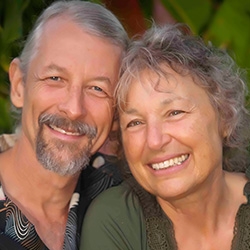
Search Results: persistence
-
Trainer Tip: Persisting without demanding is the art of what Marshall Rosenberg fondly called "Dogging for our needs." We can learn to not give up on our needs and at the same time, refrain from demanding they be met.
-
Trainer Tip: When in a conflict that doesn’t seem to have a solution being aware of your needs, and then being creative and flexible about getting them met, can go a long way to coming up with creative solutions that work for everyone.
-
-
Trainer Tip: When they say "no", acknowledge what people are saying "yes" to. From there, you persist towards a resolution that values both party's needs, without demand. Persisting is when we try to meet needs by continuing to connect with another. Demanding is when we insist someone do something, or else face negative repercussions. Showing care and willingness to work with people can help them to want to collaborate and resolve conflict.
-
Eric offers a very brief but valuable Trainer Tip about persistence practicing NVC, sometimes a small shift in approach can make a big difference.
-
Untethering from dominant culture and internalized oppression takes releasing attachments and persistence inspite upheavals -- all with insufficient support. Even in community building we can bring oppression into our efforts to untether. The more we walk towards vision, the more tethers of patriarchy we undo, the more the cost. By exacting such high cost, patriarchal societies reproduce and sustain themselves. To untether we need fortitude.
-
Ask the Trainer: Is it a good idea to use NVC on persistent guilt, anger or depression without the aid of others?
-
Perhaps human violence persists because we believe that violence is inevitable and there's nothing we can do about it -— even though there is notable evidence that this is likely not true. Read on for some research and theory on how cultures evolve to be collaborative or violent. Plus, learn benefits of collaboration and downsides to force, punishment, and control. These provide implications for how we might move towards a culture of more peace.
-
Join veteran Mediators and Facilitators, Jori and Jim Manske in using Nonviolent Communication and mediation skills for transforming conflict into connection between yourself and others.
-
Transform arguments with these steps: take responsibility for your mind, increase your capacity for discomfort, slow down, show up and remember your values, offer understanding, take risks, and speak from your heart. Learning new skills takes time, energy and effort. However, it’s entirely possible to radically shift the way we communicate. The key is patience, persistence, and taking it one step at a time.
-
Working on social justice and racial equity? If you include attending to white culture and privilege as part of that work, you'll reap important benefits. Understanding white culture — along with its embedded historical privileges — provides valuable insight into a larger system of inequity.
-
Ever wish you knew how you might experience more choice when you've been triggered, instead of being trapped in old habits and unmet needs? Wish you could REALLY heal old internal messages that tell you you're not good enough… not loveable… or not deserving? Join veteran CNVC Certified Trainer, Mary Mackenzie, for this 6-session course designed to deepen your ability to connect with self and heal your past through the process of Self-empathy.
-
This anecdote illustrates how a young man had the social awareness to consider how male conditioning may bring up competitiveness in his interactions with another man. The young man offered transparency and checked for consent in a way that shows an embodiment of power-with, togetherness, consideration, care, collaboration... and all without displaying any formal NVC training, and without looking to impress.
-
- Uncover the expansive possibilities of Nonviolent Communication in growing compassion for a more empathic world
- Engage with 17 global trainers on 17+ unique topics
- Connect with an international audience from novices to experts
- Immerse yourself in a festival of learning, fun, and community
-
Here's a practice for cultivating more awareness of our thinking and choices, when our feelings and thoughts become stimulated.
-
Every one of us is impacted many times each day by micro-freezes that are the resulting fallout from both recent and long ago painful events. During this powerfully healing course, Sarah will walk you through a unforgettable tour of neuroscience, and succinctly demonstrate how NVC and neuroscience together can change your brain and enable your life to become both more fluid and far more resilient.
-
The heart of the practice of nonviolence is a commitment to live through the powerful combination of compassion, fierceness, and courage, with an uncompromising willingness to stand for truth. Join Miki Kashtan for this exciting and informative course to learn how to practically embrace nonviolence.
-

In this 6-session course Sarah Peyton will take you through the 5 levels of unconscious contracts that can create patterns of self-sabotage and self-defeat. Each session introduces a different unconscious contract based on various aspects of relational neuroscience and provides support for the release of these contracts.
Sarah Peyton shows you how, with deep empathy, self-accompaniment, and an understanding of neuroscience, you can free yourself from your original constraints.
It can be bewildering to be human.
We can make so many choices that are not good for us. Why do we persist in habits, incapacities or self-judgments that are harmful to our long-term well-being?
The answer to this question is surprising – it is usually either love – or - paradoxically, survival!
Love is at the root of self-sabotage.
Though we often aren't aware of it, our nervous systems are essentially still paired with our earliest caregivers and often related to how we responded as a child. Our first interactions shape us in ways that can limit our life energy.
-
Most people want to punish perpetrators of sexual violence. Unfortunately, punishment doesn’t lead to lasting widespread change. Rather, we can identify root causes and conditions that sustain violence. That means shifting from individual to systemic lenses, and from punitive to restorative responses. It means collective learning about how such acts are nurtured and persist. This can reduce the chance of it happening again.

















